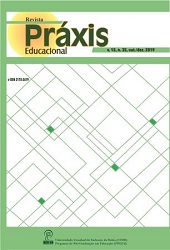EXPERIENCIAS DIDÁCTICAS EN LAS CARRERAS DE ARQUITECTURA Y URBANISMO: POR MOVIMIENTOS DE INCORPORACIÓN
DOI:
https://doi.org/10.22481/praxisedu.v15i35.5674Palabras clave:
Arquitectura y Urbanismo, Formación, IncorporadoResumen
Este trabajo consiste en presentar tres experiencias didácticas, realizadas en el ámbito de la Facultad de Arquitectura y Urbanismo de la Universidad Federal de Juiz de Fora, en el cual se priorizó la inmersión de estudiantes en ambientes que no fuesen propiamente las salas de clase. Tales experiencias, desarrolladas en el camino de la metodología de investigación-acción, buscaron privilegiar el contacto de los estudiantes en situaciones que los hicieran reflexionar sobre los seres y las cosas que conforman los ambientes en que estuvieron y, de cierta forma, establecer relaciones con ellos, colocando atención especial en las dinámicas provocadas por eses seres y cosas, y como en ellas eses seres se imbrican mutuamente en el cotidiano de las ciudades. Las discusiones surgidas con los estudiantes durante estas experiencias, su devolución en forma de narrativas y la observación de la complejidad de sus discursos y acciones junto a las actividades académicas que nos fue posible acompañar incentivaron la proposición de una tesis de doctorado junto al Programa de Posgrado en Arquitectura y Urbanismo de la Universidad Federal de Bahía. Tanto en la tesis como en el presente artículo, se defiende la adopción de mudanzas en la enseñanza de las carreras de grado de Arquitectura y Urbanismo brasileñas pautadas en referencias paradigmáticas diferentes a las cartesianas: “Pensamiento Complejo”, “Filosofía de la Diferencia”, “Biología del Conocer”, “Educación de la Atención”, todo eso dirigido hacia la valorización de la “Experiencia” en el mundo. La intención es que la formación de estos estudiantes posibilite la construcción de subjetividades próximas de lo que llamamos “postura incorporada”, más en consonancia, a nuestro ver, con la complejidad del mundo como un todo.
Descargas
Métricas
Descargas
Publicado
Cómo citar
Número
Sección
Licencia
Usted es libre de:
Compartir — copiar y redistribuir el material en cualquier medio o formato; Adaptar — remezclar, transformar y construir a partir del material para cualquier propósito, incluso comercialmente. Esta licencia es aceptable para Obras Culturales Libres. La licenciante no puede revocar estas libertades en tanto usted siga los términos de la licencia.
Bajo los siguientes términos:
Atribución — Usted debe dar crédito de manera adecuada, brindar un enlace a la licencia, e indicar si se han realizado cambios. Puede hacerlo en cualquier forma razonable, pero no de forma tal que sugiera que usted o su uso tienen el apoyo de la licenciante.
No hay restricciones adicionales — No puede aplicar términos legales ni medidas tecnológicas que restrinjan legalmente a otras a hacer cualquier uso permitido por la licencia.










